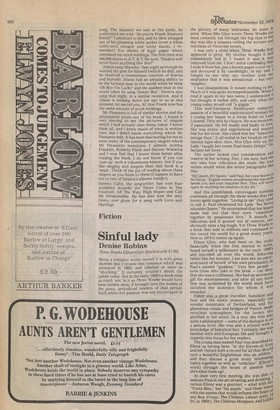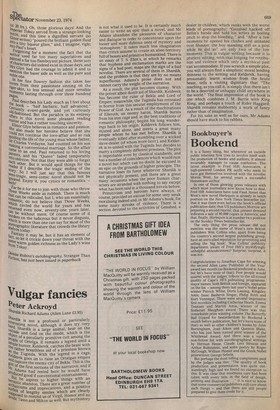Fiction
Sinful lady
.Denise Robins
Three Weeks Elinor Glyn (Duckworth £.1.95) Being a romantic writer myself it is with great interest that I review this romance which was produced in 1903, and labelled at once as "shocking." It certainly wouldn't shock the public today. But in the early 1900's a book with as much 'sex' in it as Three Weeks would have been hidden away if brought into the homes of the pious, prejudiced readers of that period. Such white-hot passion was not encouraged in the privacy of many bedrooms, let alone in print. When Mrs Glyn wrote Three Weeks she most certainly cut through the fog that in her day Was like a miasma veiling the actions and reactions of Victorian lovers. I was only a child when Three Weeks first appeared in print. My mother bought it and immediately hid it. I found it and it was removed from me. I don't mind confessing that I stole it from her, put a brown paper cover on it and devoured it by candlelight, in my bed. I longed to see why my mother told my stepfather that it was sensational — but very naughty. I was disappointed. It meant nothing to me; Much of it was quite incomprehensible. When read it again in my late teens, I understood it but thought it rather silly, and only what the young today would call "a giggle."
This mid-European flamboyant romantic passion of a beautiful sophisticated woman for a young boy began in a Swiss hotel on Lake Lucerne. They met by chance. He was innocent, if passionate. He fell madly and badly in love' She was exotic and experienced and wanted him for her lover. She called him her "beautiful savage Paul." It all ended in her boudoir on the famous tiger-skin, then, Mrs Glyn tells us, the Lady "taught her sweet Paul many things." He became her lover. The author lacked cool consideration and reserve in her writing. Nor, I am sure, had she any idea how ridiculous she made the love scenes sound when she wrote paragraphs like this: "MiQueen, My Queen," said Paul, his voice hoarse in his throat. "English women would seem like wax dolls b,eside you, and your exquisite face. They will never again be anything but shadows in my life."
And this uninhibited, extravagant wording continues all through the three weeks that the lovers spent together. "Living in sin" they used to call it. Paul christened his Lady "his fierce adorable Queen." He maintained that her kisseS made him feel that they were "cemented together by passionate love." It sounds ridiculous and if quoted out of context, can obviously raise a big laugh. Yet Three Weeks is a book that sold in millions and continued to riot round the world for a great many years. Now in 1974 it comes up again. Elinor Glyn, who had been on the rocks financially when she first started to write' found herself a millionaire in the early 190'5 and travelled all over the world, behaving rather like her heroine. I am sure she incorporated much of herself, of her own personality, in Paul's adored "goddess." Very few people — even those who joke at the book — can denY that she was a craftsman. She had an enormous gift for entertainment, and after all any book that was acclaimed by the world must have 'satisfied the audience for whom it was intended. Elinor was a great traveller. Sunshine and heat and the exotic scenery, especially the wonder mountains of Switzerland, and the glamorous canals and bridges of Venice, made excellent atmosphere for the lovers she glorified in her novel. In a way she was also quite a philosopher — some of the dialogue is 0/1 a serious level. She was also a scholar with a knowledge of historical fact. Certainly she was familiar with mid-European life and brought it expertly into focus for her readers. The young man named Paul was described bY Elinor as having been "in the Eleven. at Et9rici and left Oxford with a record for all that show,, turn a beautiful Englishman into an athlete, and they discuss a great many interestirl,g topics together as well as "undulate" (Elirl?t st word) through the hours of passion tua shrivelled them up! At their very first meeting she was able t°,, instruct Paul in the art of eating and drinking. reckon Elinor was a gourmet — whatwith her "Truite Bleu," her "fat quails," and those wineS, with the names that would inflame the heart la! any Bon Viveur. The Chciteau Latour (onlY, frs. in 1903!), The Cheiteau Margaux, and LaJE'e
(at 20 frs.). Oh, those glorious days! And the f,TPerial Tokay served from a strange-looking
le, and this time a dignified servant (so f-linor writes) "poured the brilliant golden fluid !tit° a tiny liqueur glass," and, I imagine, right Ihro Paul's heart. Forgetting for a moment the fact that the author used far too many superlatives and P,,Inted a far too flamboyant picture, these sort u,!.characters did indeed exist in those days, and rZesntGilyn had the courage to admit it and to noble oonnethe baser side as well as the pure and 1,11I her fine flowery fashion she takes her ,vers from their passionate sinning on the uger-skin, to less sensual and more sensible
Inornents lasting through over three hundred Pages.
,,Paul describes his Lady much as I feel about e book — "half barbaric, half advanced."
olertainlY avant-garde, and yet curiously ofcfl-fashioned. But the paradox in its entirety
ers in this novel some pleasant reading wafter and has a rather touching sincerity. She Glyn believes in romance and passion.
Tle also made her heroine believe that she 1/4;0111d not continue the love-affair and so risk
g the life of the young man whose father, 'Ir Charles Verdayne, had counted on his son
,Making a conventional marriage. So the affair Par to an end. Paul returned to his loving reras, and his "Queen" faded temporarily _hat° oblivion. Not that they were able to forget eh other. But it would spoil things for the read Other. if I describe the tragic ending of the
Sto
I will just say that this famous
Sto
rY. So se, n•ii-tragic se, n•ii-tragic semi-comic novel should not be Lghored. Enjoy it, you cynics or romantics uoth!
„Par be it for me to join with those who throw ree Weeks aside as rubbish. There is much mat can be ridiculed, but I, who am essentially ,Mantic, do not believe that Three Weeks, rn't,ich circled the world for years and has ''-orned even now, seventy-one years later, be-aoh be without merit. Of course some of it rclers on the ludicrous but it never disgusts, hich is more than one can say for most of the ,Pbc/r,hographic literature that crowds the library -.elves today. f Fantasy it may be, but it has an element of :tr, so let it trickle down your throat with the ft,"Ille warm golden richness as the Lady's wine Tokay, be„ • 'LSe Robins's autobiography, Stranger Than ic • tIOU, has just been issued in paperback



































 Previous page
Previous page